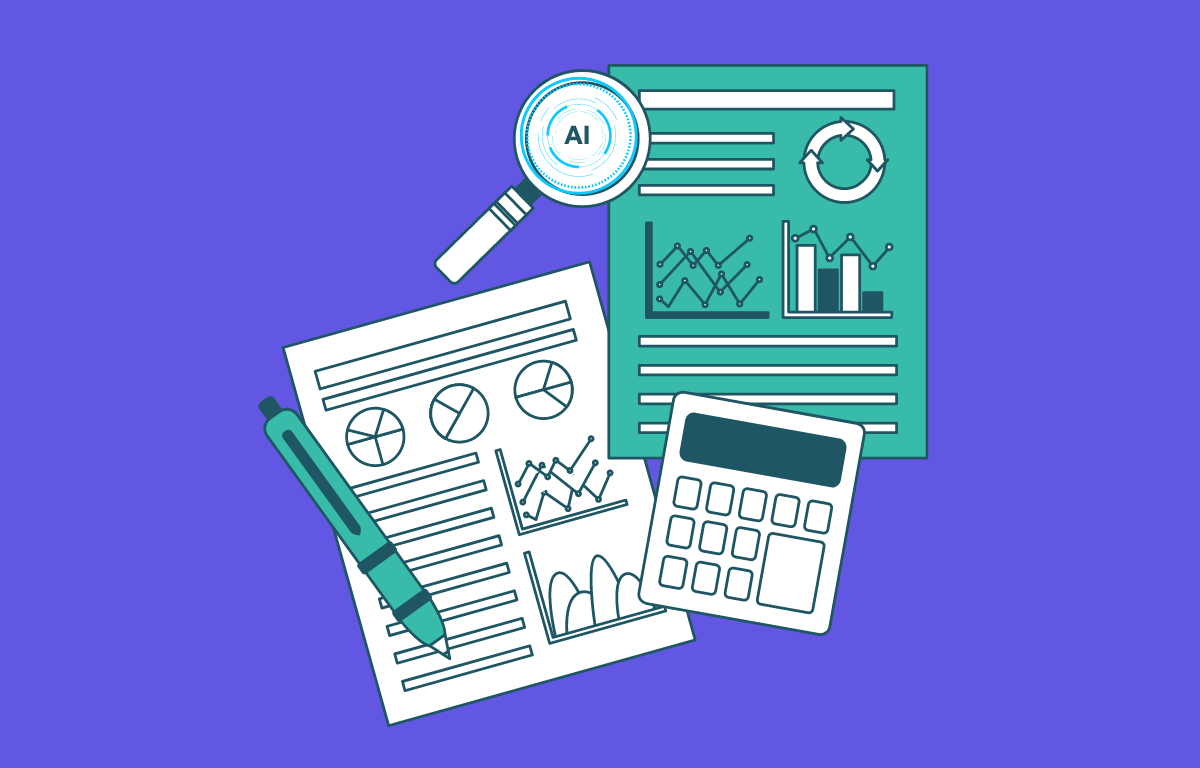
49 Top Artificial Intelligence Stats and Trends
Did you ever imagine that there would be a time when machines would predict stock market trends with the precision of a seasoned investor or perform groundbreaking diagnostics and revolutionize the entire healthcare industry?
Certainly, you did! But most of you would not have expected this to happen in your lifetime.
While all of this might sound like science fiction, it’s the biggest reality of this decade. Though artificial intelligence was originally thought of as a futuristic idea, it has already arrived and is drastically changing our world in ways we never could have predicted.
You should not distance yourself from the AI revolution or else your job can get in danger! Instead, embrace it with a strategy to benefit from it. And no strategy is complete without solid data and statistics, right?
Don’t worry! We’ve got you covered.
We will give you a detailed overview of the current state of AI, its impact on various industries, and emerging trends through an accurate estimate of the market size of artificial intelligence. So, if you’re a tech enthusiast, a business leader, or simply a curious soul, these insightful metrics will give you a look into the near future.
Current State of Artificial Intelligence
Artificial intelligence is slowly taking the world by storm. Let’s analyze where it is standing today and how far it is expected to go.
Market Size of Artificial Intelligence
1. ChatGPT gained 1 million users in the first five days (CNBC)
With the debut of ChatGPT in 2023, it gained 1 million users in only the first five days. This represents the fast adoption rate of ChatGPT. We can see the streak continuing in 2024 as well.
2. 6 out of every 10 companies associate AI with productivity (Forbes)
A significant 64% of businesses believe that artificial intelligence would help to increase their overall efficiency, according to a Forbes Advisor survey. This illustrates the increasing belief in AI's potential to completely transform how companies operate.
3. Currently, the AI software market generates about $100 billion in revenue globally (Omdia)
This is one of the most important artificial intelligence statistics as it highlights the increasing adoption of AI and the rapid integration of AI technologies in the software industry.
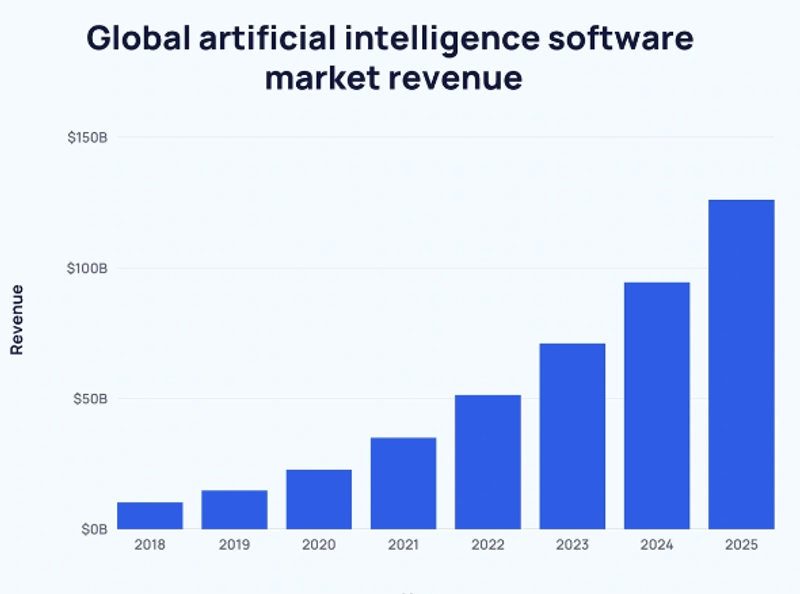
4. Nine out of ten companies use AI to gain an edge over rivals (MIT Sloan Management)
87% of international companies believe AI technology will give them a competitive advantage, which showcases an eagerness to adapt to AI technologies. This is a 12% rise over the previous year.
5. The total market size of AI is around $196.63 billion
The global AI market has seen a surge of $60 billion since 2022. Today it is standing at a whopping $196.63 billion.
Artificial Intelligence Growth Statistics
6. AI will account for 26% of China's GDP by 2030 (PwC)
According to data on AI utilization, artificial intelligence will account for roughly 26.1% of China's GDP by 2030. The USA will come second with 14.5% of its GDP coming from AI. This shows that global leaders are quickly shifting their technological priorities.
7. The anticipated size of the AI market is $407 billion by 2027 (MarketsandMarkets)
The global market for artificial intelligence is expected to rise significantly from its previous $86.9 billion in revenue in 2022 to a whopping $407 billion by 2027.
8. 10% of automobiles will be self-driving by 2030 (Statista)
10% of all cars are expected to be driverless by 2030. There has already been an increase from 20.3 million driverless cars in 2021 to 62.4 million in 2024.
9. A 56.3% growth in AI regulations (Stanford)
The number of AI-related regulations in the US has increased significantly in recent years. It has increased from one in 2016 to 25 in 2023. Just last year, there were 56.3% more regulations on AI than there were before.
10. The AI market will expand by 26% in the coming year (Tractica)
Recent artificial intelligence statistics suggest that the AI market is all set to have a profitable future. The AI market already rose by 47% between 2021 and 2022. Currently, the growth rate suggests an upward trajectory that can increase by 26% annually till 2025.
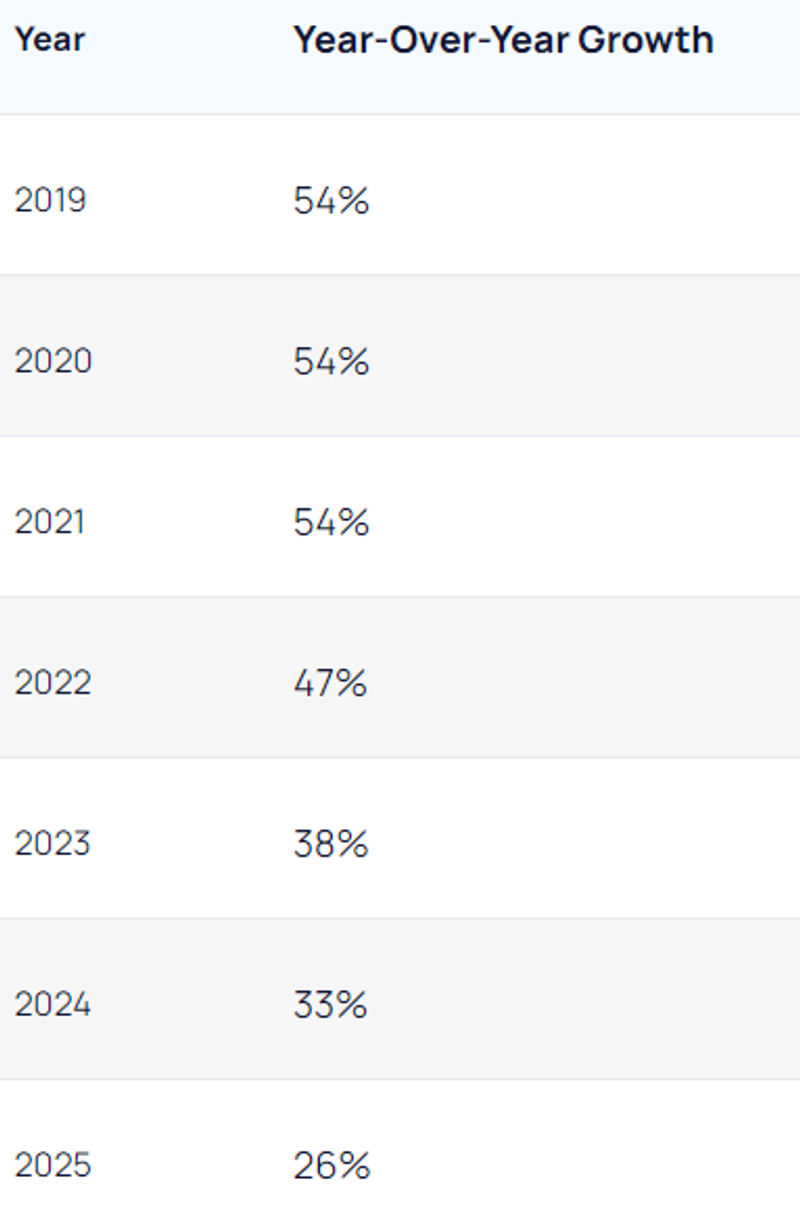
Artificial Intelligence Statistics in the Job Market
One of the most important aspects of AI is the changing dynamics of the job market. Here are some statistics showcasing current and future trends.
11. AI can automate work done by employees (McKinsey)
Tasks that currently take up between 60% and 70% of workers' time can be automated by current AI technologies. It shows that AI can significantly reduce workload and save time for maximum efficiency.
12. AI can significantly impact the job performances of 80% of Americans (OpenAI)
At least 10% of the jobs performed by 80% of American workers may be impacted by generative AI. More than half of the work for 19% of the workforce could be impacted and create immense operational changes.
13. AI adoption requires the retraining of 20% of the workforce (Statista)
Adoption of AI may require retraining for at least 20% of staff in enterprises so they can stay up to date with technological advancements.
14. AI will automate 90% of data management jobs (Statista)
Jobs in data management are probably going to be most affected by AI. Generative AI is expected to automate about 90% of data processing jobs and 80% of data collection jobs.
15. Generative AI significantly impacts legal professions (Forrester)
Legal professions are the ones in the US where generative AI is having the biggest impact, at 78%. AI will completely revolutionize the methods of case research and document reviews
16. 52% fear losing their jobs (Mitre)
According to recent artificial intelligence statistics, 52% of American individuals in employment fear AI will take their jobs and feel helpless about this.
17. 47% of businesses are no longer hiring (Tech.co)
47% of companies think about utilizing AI instead of recruiting more staff members. They believe that AI can generate the same amount of output and save them money in the long run.
18. AI to Replace 1 in 3 Workers by 2024 (Resume Builder)
By 2024, AI could replace workers in one in three enterprises. This shift is driven by AI’s ability to automate tasks and save time and resources.
19. 96% of recruiters value AI skills (Resume Builder)
In 2024, employers are giving more preference to applicants who have relevant technical knowledge regarding AI. 96% of recruiters are hiring professionals who have the expertise to utilize AI for maximum efficiency in their jobs.
Impact of AI on Various Industries
AI is not just for tech junkies, it has usage in almost every industry. The following artificial intelligence statistics imply the changing dynamics in various industries.
AI and Marketing Trends
20. 34% of companies use generative AI for marketing (Mckinsey 2024)
16% of the companies polled said they were utilizing AI openly for content support in their marketing strategy. Whereas, 34% of firms said they had integrated generative AI into their sales and marketing methodologies.
21. 68% of Americans trust AI for content personalization (Gallup, 2023)
A Gallup survey found that when it comes to personalizing online content for users, 68% of Americans say AI is at least as good as humans. On the other hand, 65% think it's much better than humans when it comes to making suggestions for goods or services.
22. 75% of content marketers use AI (Content Marketing Institute, 2023)
Recent artificial intelligence statistics reveal that 75% of content marketers employ generative AI tools like Grammarly and ChatGPT in their jobs. This includes activities like brainstorming ideas (47%), researching headlines and keywords (46%), proofreading (29%), and content generation (36%).
23. 41% of marketers use AI for content automation (Adobe 2024).
41% of marketing professionals who are putting generative AI into practice intend to use it to automate content production tasks including crafting original content, articles, social media posts, and landing pages.
24. 25% use of AI for tailored emails (Adobe, 2024)
About 25% of practitioners craft tailored emails, messages, and other copy using generative AI. Moreover, 23% use this time-saving AI technology to create personalized pictures, infographics, or videos.
AI and Education Trends
25. 60% of educators use generative AI in the classroom (Forbes)
A study on the use of AI in the classroom was conducted in October 2023 by Forbes Advisor, which polled 500 active instructors nationwide. Results found that every 6 in 10 educators were using AI to teach students. According to the poll, teachers under the age of 26 reported the highest usage rates.
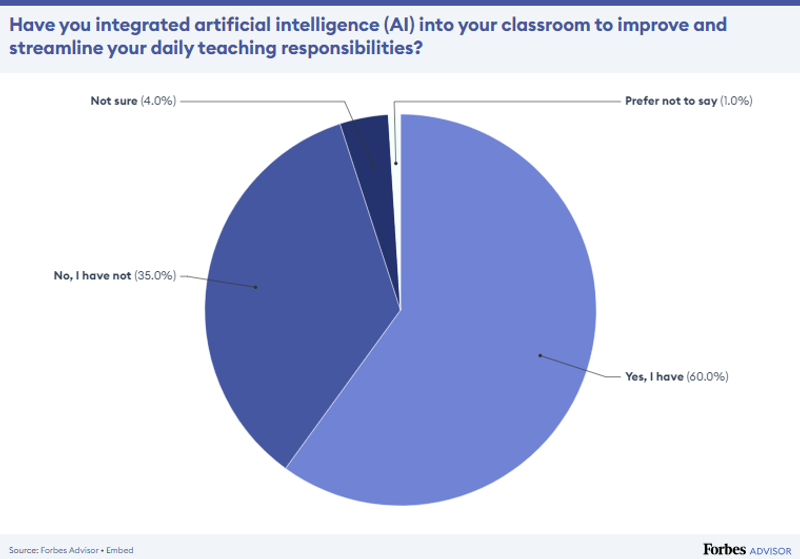
26. AI can enhance teaching methodologies with 85% accuracy (WorldMetrics)
AI can be utilized as a powerful tool to analyze student data. Through that data, AI can identify patterns and enhance the teaching methodologies with 85% accuracy that cater to specific student needs.
27. Two-thirds of students use AI tools to improve their studies (Nature)
A German study surveyed 6300 students to measure the usage of AI in education. The results found that 63.4% of students utilized AI to improve their studies.
AI and Business Trends
28. Approximately a quarter of entrepreneurs are worried about how AI will impact website traffic (Forbes)
According to a Forbes Advisor poll, 24% of business owners are worried about how AI can affect website traffic and what effects it would have on their operations. This shows how apprehensive some companies are about using AI in their daily operations.
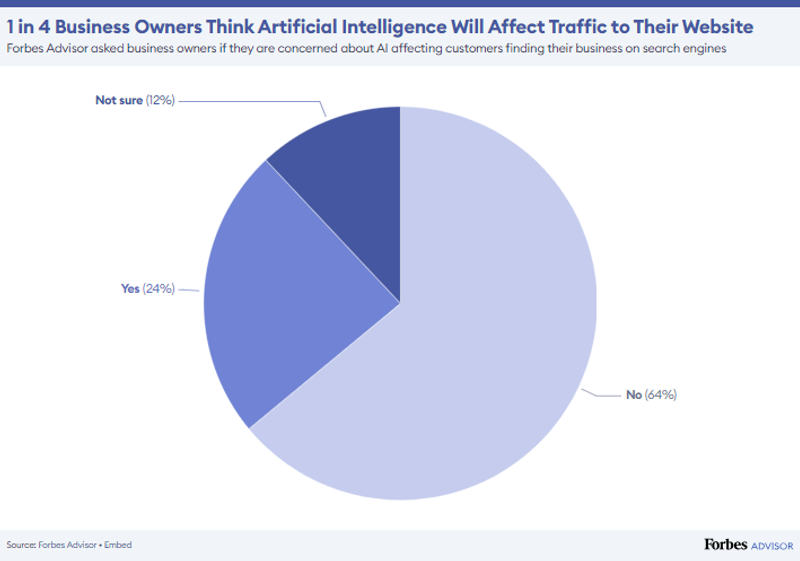
29. 97% of entrepreneurs think ChatGPT will benefit their company (Forbes)
Artificial intelligence statistics reveal a shocking 97% of business owners think ChatGPT will help their companies, according to Forbes Advisor. 3 out of 5 organizations intend to utilize ChatGPT for content creation on their websites, and 44% want to produce content in more than one language.
30. More than 60% of entrepreneurs think AI will enhance client interactions (Forbes)
According to Forbes Advisor, 64% of business owners think AI can strengthen customer connections. This demonstrates a positive view of the technology's potential to improve client interactions.
31. More than 60% of entrepreneurs believe AI will boost output (Forbes)
More than 60% of entrepreneurs are positive that the usage of generative AI will significantly boost output. More specifically, 64% of respondents said AI would increase company productivity. Whereas, 42% said it would simplify work and operations.
32. 43% of companies worry about their reliance on technology (Forbes)
Business owners worry about technology dependence in 43 percent of cases. Moreover, the technical ability to use AI efficiently is a concern for 35% of business owners. These artificial intelligence stats draw attention to the difficulties businesses have while implementing AI technology.
33. 95% of professionals agree that AI automates monotonous jobs (Freshworks, 2023)
According to 95% of IT professionals, generative AI increases worker productivity by automating monotonous jobs so that workers may concentrate on more complicated work.
34. 86% of CxOs see generative AI as revolutionary (Accenture)
86% of CxOs feel that generative AI will have a revolutionary effect on their company and the industry at large, and almost all of them are already using it in some capacity in their work.
35. 94% of professionals will learn new skills for AI (Accenture)
Even while an astounding 94% of people said they would be prepared to learn new skills to work with generative AI. However, only 5% of businesses are currently funding extensive employee reskilling programs.
36. AI systems can generate up to 50% more leads (Review of Harvard Business)
Artificial intelligence algorithms provide useful information about a customer's buying behavior and show data on which products have the biggest profit margins.
According to recent artificial intelligence statistics, AI technology can generate 50% more leads and 60% shorter call times, which results in up to a 60% decrease in overall costs.
AI and Finance Trends
37. AI market size is set to reach $1.8 trillion by 2030 (Statista)
As of 2023, the market for AI technology is expected to be worth a whopping $200 billion. The artificial intelligence statistics suggest that this market is expected to develop significantly, with estimates reaching over $1.8 trillion by 2030.
38. AI businesses are taking the lead by 60% (Statista)
The difference between the valuations of AI and non-AI firms is growing. The former is seeing far greater valuations than the latter. AI startups are valued 60% more at the B-series investment stage than non-AI startups
39. Investments in AI reached $25.2 billion (Stanford AI Index Report, 2024)
Investments in generative AI alone soared to $25.2 billion in 2023. This is an almost eight-fold rise from the previous year. AI funding saw a tremendous surge in 2023.
40. AI-focused businesses raised $12.2 billion (Crunchbase)
Compared to the prior quarter, the first quarter of 2024 saw an increase in venture financing for AI businesses. A little 4% increase from the $11.7 billion invested in 1,072 deals during Q4 2023, AI-focused businesses raised $12.2 billion across 1,166 deals in Q1 2024.
41. Billions invested in AI firms (Crunchbase)
$4.7 billion in venture capital was invested in AI firms in February 2024, making up almost 20% of all venture capital invested in that month. This is as opposed to the $2.1 billion that was put into AI businesses in February 2023.
42. 1,812 Global AI Startups Funded in 2023 (Our World In Data)
The AI sector saw a spike in investments in 2023, with the US leading the way as the nation with the greatest number of recently funded AI businesses. In that year, 1,812 AI businesses globally were funded with an average of more than $1.5 million. Of them, 897 were based in the United States, 368 in the United Kingdom and Europe, and 122 in China.
What are the Future Trends of AI?
43. 39% Expect Generative AI to Increase Hiring (Deloitte, 2024)
A greater number of firms (39%) believe that generative AI will result in hiring more employees soon. On the other hand, a lesser amount (22%) believe that headcount would decrease. The increasing need for experts in generative AI and data-related disciplines could be the cause of this rise.
44. 51% Believe AI Will Improve Jobs (Google and Ipsos, 2024)
According to a recent survey, in the next five years, more than half of respondents (51%) think artificial intelligence (AI) will improve their jobs. Whereas, 25% of respondents predict no impact, and 16% fear AI will hurt their jobs. The remaining 8% are unsure if AI would enhance their job or cause them trouble.
AI Belief and User Attitude
As AI becomes more prevalent across multiple industries, it will be imperative for firms to acknowledge customer concern which is only possible through knowing artificial intelligence statistics.
45. 65% of customers are okay with companies using AI (Forbes)
Although there are worries regarding the use of AI, 65% of customers still have faith in companies that use the technology. This implies that companies may preserve consumer trust and even capitalize on AI's promise to enhance customer experiences if they employ AI ethically and openly.
46. More than half think AI will make writing better (Forbes)
54% of respondents think AI may enhance written content, indicating that ChatGPT and other AI-driven solutions may be able to create compelling content that does not sound very robotic.
47. 76% worried about false information spreading through AI (Forbes)
76% of consumers are worried about false information coming from AI technologies like Bing Chat, ChatGPT, and Google Bard. Of the people who were polled, 54% said they could distinguish between information produced by automated chatbots and content written by humans.
48. Only 7% of consumers trust chatbot claims (Accenture)
Even while chatbots are becoming more common, there is still a long way to go. Only 7% of respondents said they believe chatbots when they make a claim. Whereas, 49% only trust humans in customer service.
49. About 3/4 of CEOs are concerned about the lack of openness in the AI industry (PwC)
According to a 2017 survey, 76% of CEOs are concerned about the global AI market's lack of transparency and the possibility of biased decisions.
Conclusion
These are the latest AI trends and stats. AI is a strong and revolutionary technology that will impact almost every industry in the world.
The listed artificial intelligence statistics depict the gradual reshaping of industries and job markets. These insights and metrics can help businesses and individuals adapt and strategically embrace AI technology.